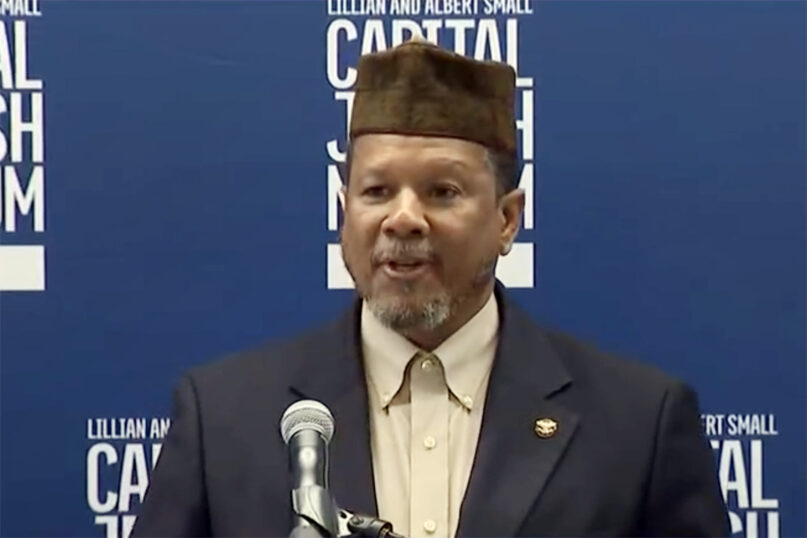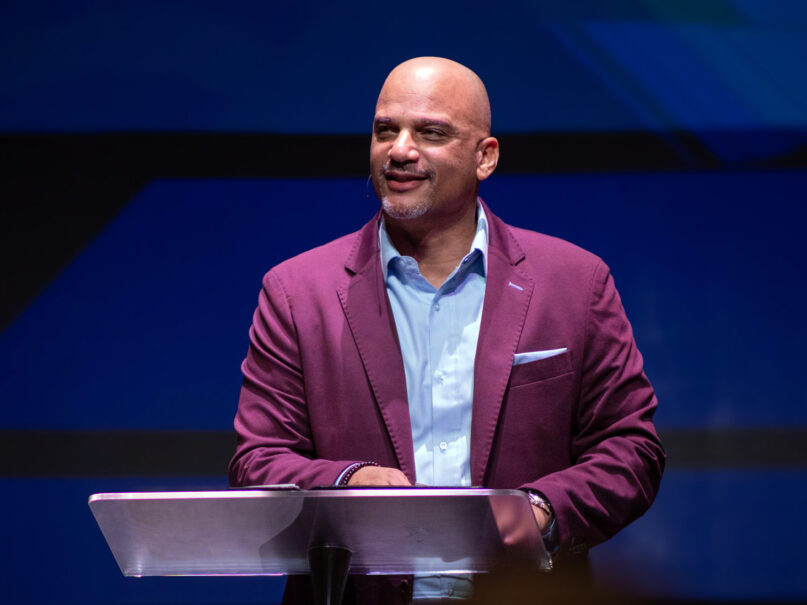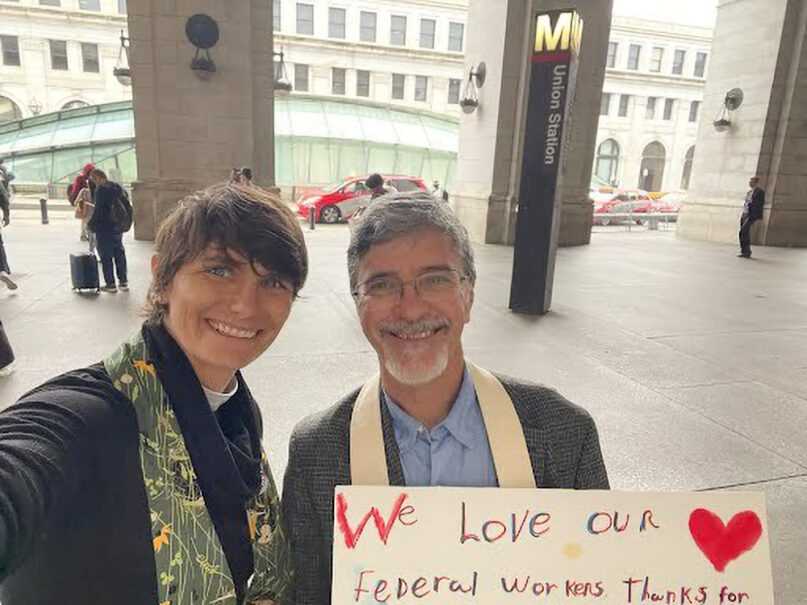(RNS) — Leaders of Washington-area congregations are responding to the continuing federal government shutdown with many approaches, including encouraging employees going to work without pay, offering food and, in some cases, giving financial assistance.
With the shutdown in its third week, religious leaders serving furloughed government employees say they are relying on their faith and are frustrated with politicians on both sides of the aisle. They echo what they are hearing from workers, who are wondering if they’ll be able to return to their jobs or receive back pay.
Terry Lynch, executive director of D.C.’s Downtown Cluster of Congregations, said some people were able to manage their finances for a week or two, but now are turning to their houses of worship for help.
“They’re trying to ask their congregations for financial assistance, for basic costs,” he said. “It could be rent. It could be mortgage. These are, a lot of times, middle-class families who’ve never had to ask for assistance. They have tuition bills because school is in session.”

Terry Lynch. (Video screen grab)
But some congregations no longer have funds to help as they could in the past, having already supported congregants who suffered income losses due to cuts instituted by the federal Department of Government Efficiency, he added.
“They’ve been impacted by reduced giving through the traumas that have already happened, so the shutdown on top of the DOGE cutback is like a double whammy,” Lynch said.
RELATED: Around DC, congregations aid those who’ve lost the ‘good government job’
More than 700,000 federal employees have been furloughed since the shutdown began Oct. 1, according to the Bipartisan Policy Center, which works with Democrats and Republicans to pass legislation. Before, in mid-June, it was estimated that more than 154,000 workers from dozens of agencies took part in a deferred resignation program, for which their pay ended on Sept. 30. Others have been fired outright since the start of the second Trump administration.
Prior to the shutdown, faith leaders in the Washington metropolitan area had grappled with how to preach and pray for congregants who were losing their jobs or facing the threat of work loss. Funding freezes and budget cuts prompted upticks in calls for pastoral care from people who suddenly had to cope mentally and financially with no longer having their so-called “good government job” after decades-long commitments.
In recent months, some houses of worship have offered online prayer groups, in-person listening circles and job-hunting workshops to help people live with anxiety, uncertainty and new realities.
But, while some have a financial cushion to ride out unexpected economic changes, the shutdown — the length of which is uncertain — has created a crisis for others, clergy say.
Imam Talib Shareef of Washington’s Masjid Muhammad said some in his diverse but predominantly African American congregation are living paycheck to paycheck and have now experienced their first regular payday without one. Now, they are concerned about reports that the Trump administration has said they may not receive back pay if they’re able to return to work.
“Just hearing that, you know, obviously takes the anxiety up,” said Shareef, who estimated that 20% to 30% of people in his congregation are federal workers. “And so, we certainly try to make sure that the faith is stronger than the fear.”

Imam Talib Shareef. (Video screen grab)
Shareef said his congregation, also known as The Nation’s Mosque, customarily distributes food, totaling some 15,000 pounds a month, with other faith and community partners. But now, more people are requesting food donations so they can spend money they typically used for groceries for other needs. The mosque has also helped pay for utility bills. The needs are higher than during previous shutdowns, he added — “nowhere near the responses that we’re seeing at this time.”
“If they’re hurting, that means our treasury, our general treasury for those kinds of disbursements, are also hurting as well,” Shareef said. “So we’re kind of focusing … on immediate needs, such as, ‘I don’t have any money, but I do have a light bill coming up right now.’”
At Grace Church, a multicultural evangelical church in Dumfries, Virginia, Bishop Derek Grier estimates that 20% to 30% of his congregants have either lost their jobs or entered early retirement since the Trump administration took over. Now, he said, some who kept their jobs aren’t receiving paychecks.
“When the government shuts down in the Maryland, Virginia, D.C. area, that’s like Ford Motor Company shutting down in Detroit,” he said. “It’s a huge deal, and it’s impacting a lot of people. There’s a lot of pain out there.”
Beyond families who are affected, Grier said, nonprofits, including churches, have seen budget challenges.
“Grace Church supports between 20 and 30 different charities, and if our budget gets tight, it impacts more people than you imagine,” he said of the church, which typically has about 2,500 in-person attendees on Sundays. “From women’s shelters to soldiers overcoming PTSD, it really has a significant impact.”

Bishop Derek Grier speaks at Grace Church in Dumfries, Virginia. (Photo courtesy of Grace Church)
Some clergy also said they had growing frustration with Republican and Democratic politicians, whose disagreement on health care policy led to the shutdown. Twenty-four million Americans buy health coverage through Affordable Care Act marketplaces, and tax credits make it affordable for many of them. Those tax credits expire in December, and while Democrats want the credits extended before enrollment starts on Nov. 1, the Republican Senate bill did not extend the subsidies.
“Our leaders should do better than this,” said Grier, who is planning a Washington event to discuss how to reduce political polarization within churches. “I blame both parties, and I think most of my church is doing the same thing. Both parties are responsible for this. We send folks to government to solve problems, not create problems, and we’re super frustrated.”
However, with faith in God and in politicians to come to an agreement, Grier’s congregation is offering $500 emergency loans to those who have been furloughed. And, accordingly it may have to limit its giving to local nonprofits at least until the shutdown concludes. It’s a risky move, he noted, as funding the loans also could lead to the church’s own staff layoffs.
“With a church of nearly 10,000 members, acts like this can be suicidal,” he said. “But I’ve decided — my trustees have decided with me — if our people are going down, we’re going to go down with them, and we’re going to do everything within our power to try to help people and support people.”
While he’s awaiting a report from his CFO on how many people have sought the church’s loans, he predicted requests are more likely the longer the furloughs are in place.
“If the shutdown continues for another week or so, I think that’s when we’re probably going to start getting the influx,” he said on Thursday (Oct. 16). “So, I really hope that our politicians get it together.”

The Rev. Rachel Landers Vaagenes, left, and the Rev. Mark Haper cheer on federal workers at the Union Station Metro station. (Photo courtesy of Landers Vaagenes)
Some congregations that don’t have budgets for large distributions of money or food are finding other ways to support federal workers.
The Rev. Rachel Landers Vaagenes, pastor of Capitol Hill Presbyterian Church in Washington, said members of her church have stood outside the nearby Eastern Market Metro station with signs to cheer on federal workers headed onto the subway to jobs they are currently working without a paycheck.
“We have signs that say, ‘You got this’ and ‘Happy Monday’ and ‘You can do it,’ and maybe 10 of us go and cheer from 7:30 to nine on a weekday morning because what’s worse than being furloughed is working and not getting paid,” said Vaagenes, whose 161-year-old church, a predominantly white congregation, sees 87 attendees most Sundays.
Her group also handed out granola bars and bottles of water “and definitely offered prayer as well,” she said.
Working in partnership with other churches on Capitol Hill, the Presbyterian Church (USA) congregation has also hosted a taco lunch party and other gatherings on Fridays, putting out a sandwich board to notify passersby and making calls to welcome furloughed workers in to eat and talk.
“People got together and complained, griped a little bit, vented, but also laughed and had a place to go on Friday that wasn’t the internet,” said Vaagenes, who said about 20% of her congregation has been furloughed during the shutdown or part of federal staff reductions. “Just bringing a little bit of joy is what this church is feeling called to right now.”
RELATED: In nation’s capital, Trump’s cuts and funding freezes spur pastoral-care crisis



